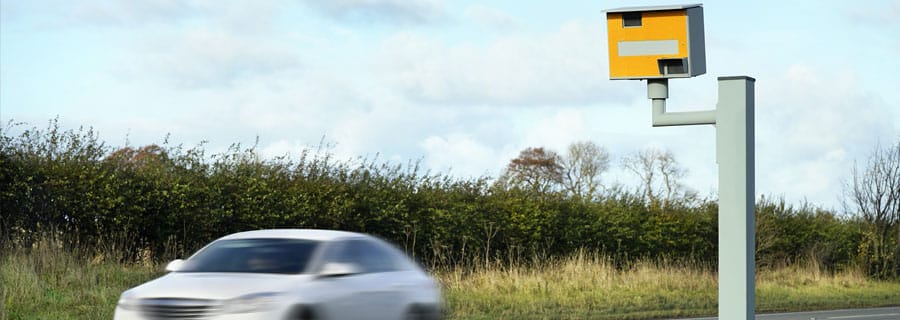Speeding towards a safer fleet

You probably saw the headlines - but speeding soared during the lockdown period in early spring.
Maybe it was the lure of fewer cars and vans on the road, but many drivers saw it as an invitation to put their foot down.
In London there was a 71% increase in drivers caught speeding by the Metropolitan Police, while in April a further 15,000 were zapped by speed cameras according to a report by the BBC .
Such figures have been corroborated by telematics data from AX, a vehicle protection and management technology provider, which said that motorists were speeding three times more frequently during lockdown compared to normal.
The AX telematics data also showed that ‘major' speeding incidents also tripled, occurring on average once every 32 miles in April compared with every 94 miles in February.
And car drivers were the worst culprits, committing twice as many more major speeding incidents than normal compared with van drivers.
Interestingly, as lockdown started to ease, so drivers started to reduce their speed, with all types of speeding incidents occurring almost half as frequently in June when compared with April.
Director of investigative services at AX, Neil Thomas, told us: “It's fascinating to see how driver behaviour has been influenced by the impacts of COVID-19.
“Whether it was simply down to reduced traffic levels during lockdown or perhaps drivers assuming police forces had bigger priorities, the data shows that given the opportunity, many drivers are clearly willing to speed and quite often significantly so.”
What are the penalties for speeding?
The minimum you can expect is a £100 fine and three points on your driving licence. If you get caught by a speed camera you will be sent a Notice of Intended Prosecution that will give you a Fixed Penalty Notice or will ask you to go to court.
For drivers who rely on their cars for their livelihood, or business owners needing to see clients, the implications of amassing speeding penalty points is an inability to perform the work that is required of them. You may be disqualified from driving if you build up 12 or more penalty points during a three year period.
AX's Neil again:
“It goes without saying that excessive speed is detrimental to everyone's safety, but it poses an additional problem for fleet managers who have a responsibility for the safety of their drivers and vehicles.
“Alerting drivers to the fitment of a telematics system is one of the most effective ways of drastically clamping down on speeding and such systems could be needed now more than ever with the possibility of a second lockdown still on the horizon.”
Socially unacceptable
The UK's largest independent road safety charity, IAM RoadSmart, wants speeding to become as socially unacceptable as drink and drug driving.
It has published new analysis that it calls ‘worrying', highlighting concerning levels of double standards. The charity's survey found that, despite more than one-in-10 drivers admitting to exceeding the speed limit of 30mph in residential areas, for almost nine out of every 10 motorists surveyed, speeding in a residential area was perceived as almost as big a threat to their personal safety as motorists driving under the influence of drugs, alcohol or when distracted by social media.
Almost half of motorists (46 per cent) surveyed believed it was acceptable to drive 10mph over the 70mph speed limit on motorways, with a quarter willing to go even faster. More than one-in-five motorists (22 per cent) believed it was acceptable to drive 5mph over the speed limit on a residential street.
Neil Greig, policy and research director for IAM RoadSmart, explained his concern: “Speeding consistently causes more than 4,400 casualties on UK roads each year. That's an average of 12 people a day killed or injured in some form. We need a fundamental shift in attitudes towards speeding so that it becomes as socially unacceptable as drink and drug driving – where public opinion has changed over previous decades.”
How should fleets prevent drivers speeding?
Neil Thomas from AX has already suggested that telematics is one way to prevent speeding.
With a telematics-based speeding report, fleet managers can see who has been speeding and how often, for example. The next step is to provide driver training to influence driving behaviour.
“The point of using telematics to highlight speeding is to make fleets safer - that has to be the ultimate aim, not only for the drivers themselves but for fellow road users and pedestrians,” Rob Marshall, the operations director at Gateway2Lease adds.
“But there are other benefits to improved driving behaviour, and these include reduced wear and tear and lower fuel costs on the fleet.”
The benefits of targeting speeding drivers
There are five key benefits.
- Reduce emissions and improve fuel efficiency
- Improve driver well-being with a more relaxed and calmer attitude to driving
- Save lives and reduce human impact of speed related accidents
- Save money - on fuel, maintenance, on car repairs
- Create a safer fleet mentality
Adds Marshall: “I don't think any business running a fleet of cars, from 10 to 100, would argue with those outcomes. Identifying appropriate behaviours is not only essential in the workplace, but in the company car, too.”
View our latest blog posts

Categories
Pages
We are a family run business based in rural Worcestershire. Our team of 38 staff are on hand to provide an exceptional service to personal and business customers.
Read More
